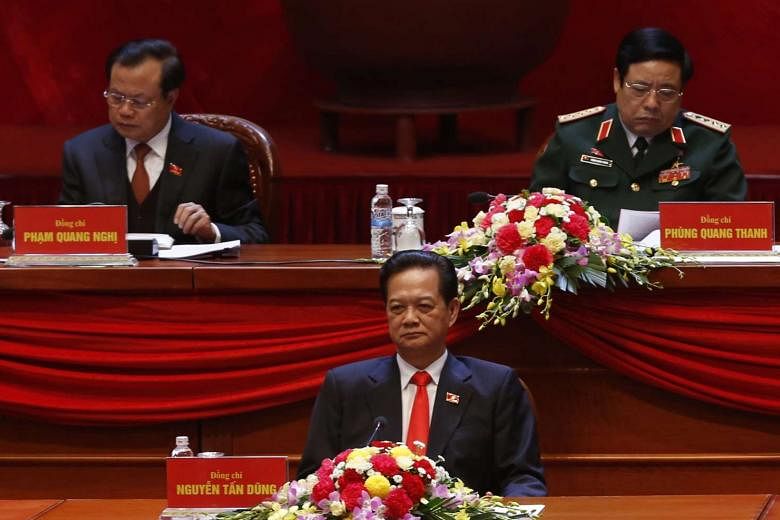HANOI (REUTERS) - Vietnam's prime minister looked set to make a political exit on Monday after the Communist Party congress accepted his withdrawal from an internal election, sources said, ruling him out of a bid for the party leadership.
Speculation has been rife in Vietnam that premier Nguyen Tan Dung's nomination for the party's central committee on Sunday signalled he was manoeuvring to challenge the politburo's agreed candidate for party chief, the incumbent Nguyen Phu Trong.
By not running for the committee, he effectively ruled out a power bid because he would need to be a committee member to be elected to its ruling politburo and rise to the top post.
Dung, 66, who has served two terms as premier, was overlooked by the elite politburo when it agreed on its nominations for key leadership posts prior to the congress.
Several party sources confirmed the congress decision, each requesting anonymity due to the sensitivity of the issue. The sources said President Truong Tan Sang was also allowed to withdraw.
Analysts say Dung, a political heavyweight widely credited with pursuing a pro-business agenda, has long been at odds with party stalwarts wary of him entrenching his power and influence.
He is believed to have cultivated broad support among businessmen and the wider party. His exit will temper excitement building in Vietnam about the prospect of a rare leadership showdown in a secretive party officially ruled by consensus.
Dung had neither declared publicly an intention to retire, nor any ambition to lead the party, which has long sought to keep a lid on internal affairs.
Dung has not commented on Monday's outcome. He is expected to remain prime minister until the legislature approves a new premier later this year.
It was not immediately clear how many of the more than 1,500 delegates voted to accept Dung's declining the nomination.
A new central committee, from within which the politburo and leaders are chosen, is to be decided on Tuesday. The congress ends on Thursday.
To stand a chance of getting on the new central committee, the party's rules stipulate Dung would have needed a majority of the congress to vote against his withdrawal, creating a path for him to contest the leadership.
Though Vietnam posted one of Asia's fastest growth rates last year at 6.7 per cent and attracted record foreign investment, analysts say resentment has festered among the party's old guard about crises in the banking sector and among state-owned firms during Dung's premiership.
Last year saw unusually fast paced liberal measures being introduced, however, including Vietnam's accession to multilateral free-trade accords, including the U.S.-led Trans-Pacific Partnership.
Though the party's strategy is to continue to strengthen the S$240-billion exports and manufacturing economy, analysts and investors have said reform momentum could become uncertain under a new leadership.

